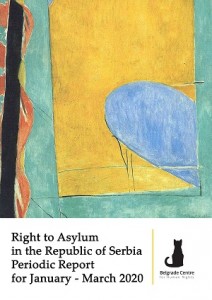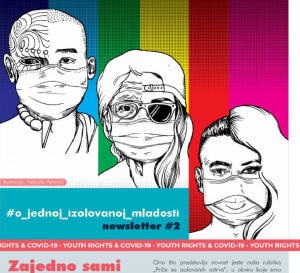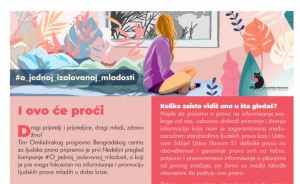Initiative Filed with the Protector of Citizens to Review the Legality and Regularity of MIA Operations during Curfew
Twelve civil society organisations (CSOs) filed an initiative with the Protector of Citizens to launch a review of the legality and regularity of the operations of the Ministry of Internal Affairs (MIA), specifically, with respect to police responses to reports of citizens rallying on top of residential buildings and firing torches and fireworks in the evenings and to granting of curfew passes.
Over the past few days, media and social networks have been publishing footage of groups of citizens lighting torches and powerful fireworks in Belgrade and other cities across Serbia in the evenings, amidst the curfew imposed under the Decree on State Emergency Measures. The fire department intervened in one such fire hazard case in Niš. There were also clashes between these people and the residents, without whose consent they climbed on the roofs of their buildings and lit torches and fireworks and activated drones.
The social media also published allegations by citizens who reported to the police violations of the curfew and the Public Law and Order Act (Article 17 prohibiting fireworks and firing weapons). They claim that the police told them that they were not competent for these misdemeanours and to report them to the local communal police instead. Others reported that the police came to the scene, but took no action after establishing that the citizens lighting torches and activating fireworks had the curfew passes issued by the MIA during the state of emergency.
Relying on Article 32 of the Protector of Citizens Act, the CSOs call on the Protector of Citizens to initiate a review of the legality and regularity of the MIA’s operations without delay, in order to establish:
- To whom the MIA’s has issued curfew passes and why,
- Whether it is true and, if so, why the MIA refused to respond to reports by citizens of violations of the curfew imposed under the Decree on the State of Emergency Measures and Article 17 of the Public Law and Order Act given that the Police Act charges the police with maintaining public law and order, identifying and investigating misdemeanours, identifying and apprehending their perpetrators and bringing them before the competent authorities, as well as with immediately forwarding all reports containing elements of misdemeanours to the police unit responsible for misdemeanours.
The initiative was submitted by:
- Belgrade Centre for Human Rights
- Belgrade Centre for Security Policy
- A11 – Initiative for Economic and Social Rights
- Centre for Judicial Research – CEPRIS
- Civic Initiatives
- Lawyers’ Committee for Human Rights – YUCOM
- Helsinki Committee for Human Rights in Serbia
- Policy Centre
- Youth Initiative for Human Rights
- Committee for Human Rights Niš
- Committee for Human Rights Negotin
- Committee for Human Rights Valjevo










